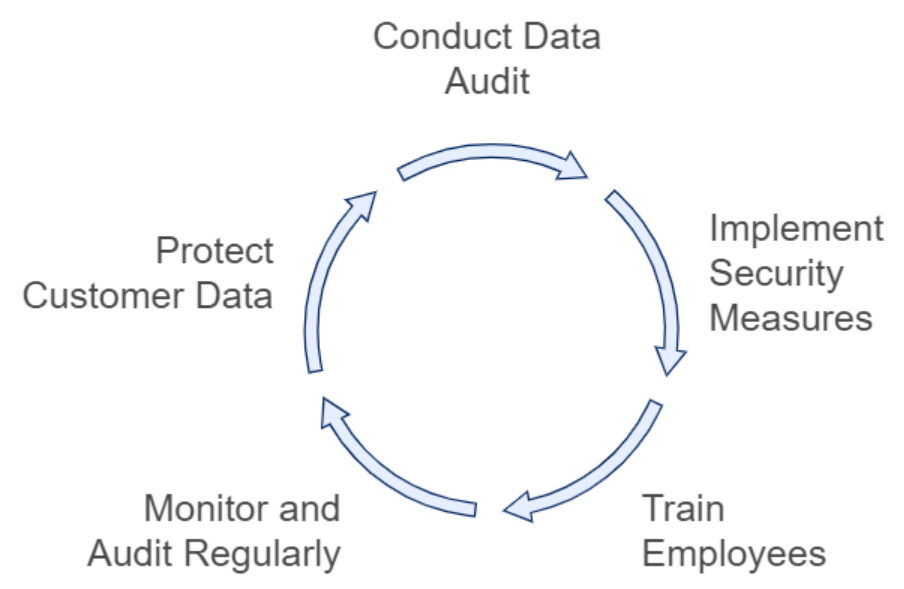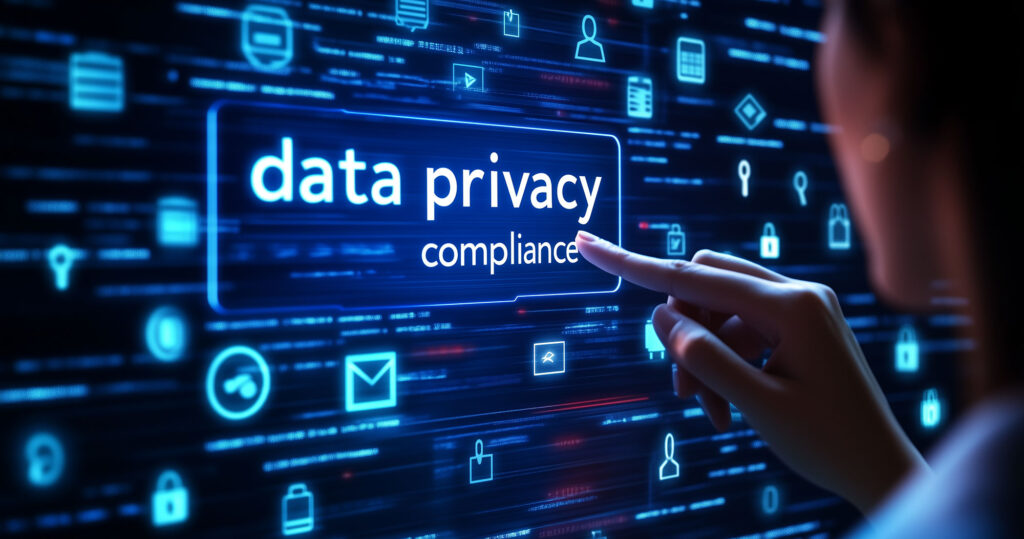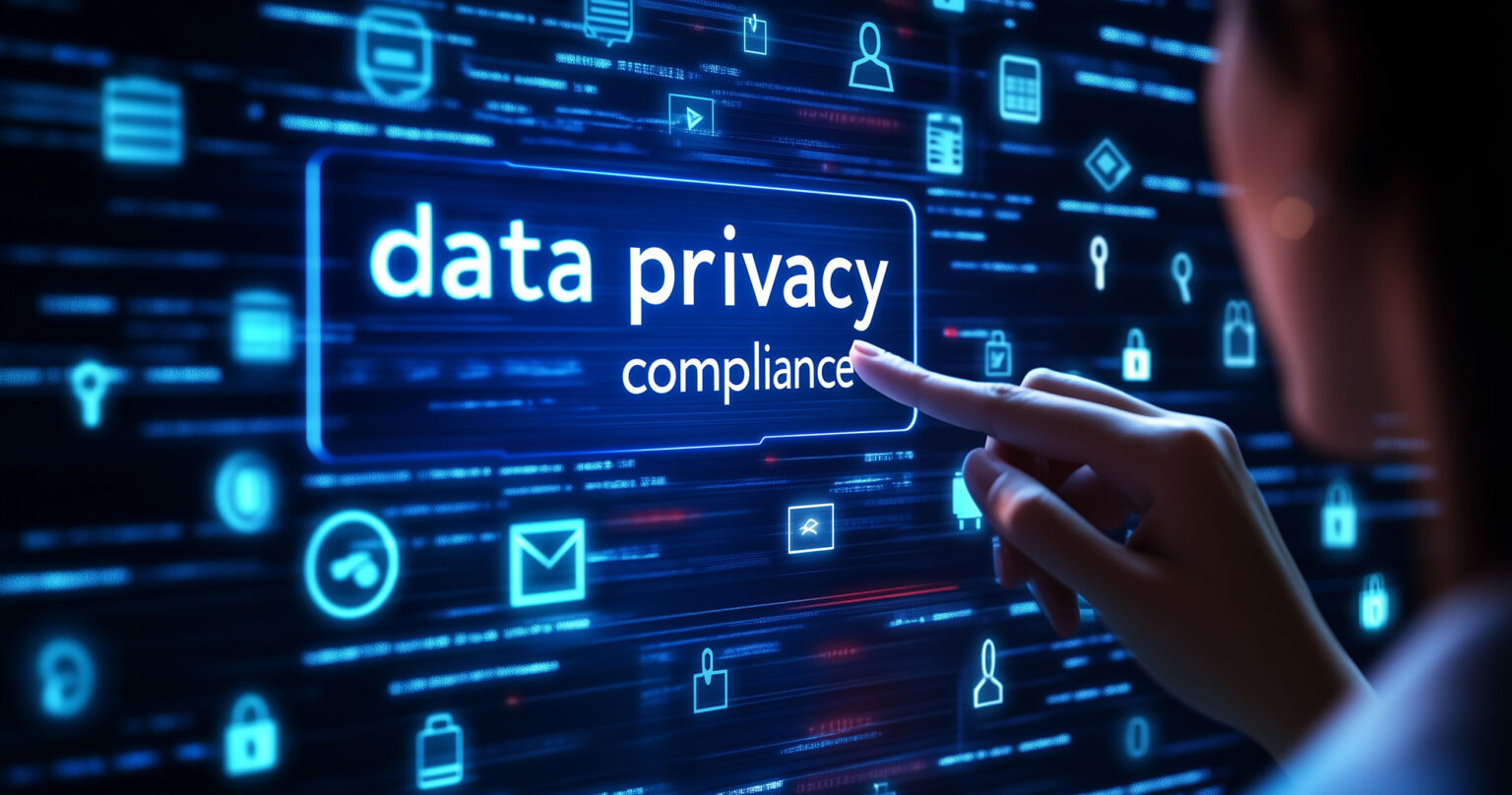Data privacy compliance refers to following laws, regulations, and guidelines that govern how personal data is collected, stored, managed, and shared. In today’s digital landscape, where vast amounts of data are generated and exchanged daily, ensuring compliance is crucial. It protects sensitive data, reduces risks associated with data breaches, and maintains the trust of customers and stakeholders. By prioritizing data privacy and compliance, organizations can navigate complex regulations, protect data, and secure their data against breaches.
Key Takeaways
- Data privacy compliance is essential for protecting sensitive data and maintaining consumer trust.
- Non-compliance with data privacy laws can result in significant fines and legal actions.
- GDPR applies to U.S. companies that process personal data of EU residents.
- Data privacy compliance reduces risks associated with data breaches and enhances brand reputation.
- Implementing robust data security measures is crucial for achieving compliance.
- Staying informed about regulatory changes helps organizations maintain data privacy compliance.
Get Compliant. Stay Compliant.
Whether you’re just starting your compliance journey or preparing for your official assessment, our platform is your compliance center.
Why is Data Privacy Compliance Important for Businesses?
Data privacy compliance is vital for businesses for several reasons. First, it helps protect against legal repercussions. Non-compliance with these laws can result in significant fines and legal actions. For example, the General Data Protection Regulation (GDPR) imposes fines that can reach up to 4% of a company’s annual global turnover or €20 million, whichever is higher. Similarly, the California Consumer Privacy Act (CCPA) enforces strict penalties for non-compliance.
Secondly, data compliance enhances consumer trust and brand reputation. Customers are becoming increasingly aware of their data privacy rights and are more likely to do business with companies that prioritize data protection. A commitment to privacy compliance demonstrates a company’s dedication to safeguarding personal information, which can improve customer loyalty and attract new clients.
Finally, compliance mitigates the risks associated with data breaches, which can have severe financial and reputational consequences for businesses. By implementing robust data protection measures and complying with relevant regulations, companies can reduce the likelihood of data breaches and the associated costs of remediation and legal settlements.
Why is Data Privacy Compliance Important for Customers?
Compliance is equally important for customers as it ensures the protection of their personal data and sensitive information. With the increasing prevalence of cyber threats and data breaches, customers are at risk of identity theft, fraud, and other malicious activities. Data privacy compliance helps mitigate these risks by enforcing stringent security measures to protect personal data.
Moreover, compliance assures customers that their privacy rights are respected. Regulations like the GDPR and CCPA grant individuals specific rights over their data, including the right to access, correct, and delete their personal information. Compliance with these regulations ensures that customers can exercise these rights and have greater control over their data.
Furthermore, data compliance fosters transparency and accountability. Companies that adhere to data laws are required to be transparent about their data collection and processing practices. This transparency builds trust between businesses and customers, as individuals are aware of how their data is being used and can make informed decisions about sharing their information.
Historical Context
The evolution of data privacy laws and regulations has been shaped by the increasing recognition of the importance of protecting personal data. Early data protection laws were established in response to the growing use of computers and digital technologies, which enabled the collection and processing of large amounts of personal information.
One of the most significant milestones in privacy compliance was the introduction of the General Data Protection Regulation (GDPR) in the European Union in 2018. The GDPR set a new standard for data protection by establishing comprehensive requirements for how personal data should be handled. It also introduced stringent penalties for non-compliance, making data privacy a top priority for businesses worldwide.
Another key milestone was the enactment of the California Consumer Privacy Act (CCPA) in 2020. The CCPA was the first major data privacy law in the United States, granting California residents extensive rights over their personal data. It set a precedent for other states to follow, leading to the development of additional data regulations across the country.
The historical context of data privacy compliance is also marked by notable data breaches that have exposed the vulnerabilities of personal data. Incidents such as the Equifax breach in 2017, which compromised the personal information of over 147 million individuals, have underscored the need for robust data protection measures and stricter regulatory oversight.
Key Features of Data Privacy Compliance
Major Components
Data privacy compliance encompasses several essential components that ensure the protection of personal data. These components include:
- Data Protection: Implementing measures to safeguard personal data from unauthorized access, use, and disclosure. This includes encryption, access controls, and secure data storage practices.
- Data Breach Response: Establishing a plan for responding to data breaches, including notifying affected individuals and regulatory authorities, and taking steps to mitigate the impact of the breach.
- Data Minimization: Collecting only the minimum amount of personal data necessary for a specific purpose and retaining it only for as long as needed.
- Data Subject Rights: Ensuring that individuals can exercise their rights over their data, such as the right to access, correct, and delete their personal information.
- Data Governance: Implementing policies and procedures to manage data throughout its lifecycle, including data classification, retention, and disposal.
Data Privacy Compliance Cycle

Key Regulations in Data Privacy Compliance
Data privacy compliance requires adherence to various regulations that establish standards for protecting personal data. These regulations provide guidelines for businesses to ensure the security and privacy of data and outline the consequences of non-compliance. Below are some of the key regulations essential for data privacy compliance.
FTC Safeguards Rule
The FTC Safeguards Rule is a regulation under the Gramm-Leach-Bliley Act (GLBA) that mandates financial institutions to implement measures to protect customer information. This rule is crucial for data privacy compliance as it outlines specific requirements for safeguarding protected data. Financial institutions must develop, implement, and maintain a comprehensive information security program that includes administrative, technical, and physical safeguards to protect customer data.
Key components of the FTC Safeguards Rule include:
- Risk Assessment: Identifying and assessing risks to customer information and evaluating the effectiveness of current safeguards.
- Safeguard Design and Implementation: Designing and implementing safeguards to control identified risks and regularly testing and monitoring their effectiveness.
- Service Provider Oversight: Ensuring that service providers with access to customer information also implement appropriate safeguards.
- Employee Training: Training staff on data privacy policies and procedures to ensure compliance and awareness.
Payment Card Industry Data Security Standard (PCI-DSS)
The Payment Card Industry Data Security Standard (PCI-DSS) is a set of security standards designed to ensure that all companies that accept, process, store, or transmit credit card information maintain a secure environment. Compliance with PCI-DSS is vital for businesses handling cardholder data as it helps prevent data breaches and fraud.
PCI-DSS includes the following key requirements:
- Build and Maintain a Secure Network: Install and maintain a firewall configuration to protect cardholder data and avoid using vendor-supplied defaults for system passwords and other security parameters.
- Protect Cardholder Data: Protect stored cardholder data and encrypt transmission of cardholder data across open, public networks.
- Maintain a Vulnerability Management Program: Use and regularly update anti-virus software and develop and maintain secure systems and applications.
- Implement Strong Access Control Measures: Restrict access to cardholder data by business need-to-know, assign a unique ID to each person with computer access, and restrict physical access to cardholder data.
- Regularly Monitor and Test Networks: Track and monitor all access to network resources and cardholder data, and regularly test security systems and processes.
- Maintain an Information Security Policy: Maintain a policy that addresses information security for employees and contractors.
Cybersecurity Maturity Model Certification (CMMC)
The Cybersecurity Maturity Model Certification (CMMC) is a framework developed by the Department of Defense (DoD) to enhance the cybersecurity posture of the Defense Industrial Base (DIB). It is particularly relevant for government contractors as it sets the cybersecurity standards they must meet to bid on and win DoD contracts.
The updated CMMC framework includes three levels of cybersecurity maturity:
- Level 1 – Foundational: This level focuses on basic safeguarding requirements, including fundamental cybersecurity practices such as antivirus deployment, regular backups, and adherence to basic cyber hygiene principles.
- Level 2 – Advanced: This level includes the implementation of NIST SP 800-171 Rev 2 security requirements. It involves more advanced cybersecurity practices and policies that are documented, managed, and regularly reviewed to ensure their effectiveness in mitigating threats.
- Level 3 – Expert: This highest level requires organizations to implement a comprehensive and advanced set of cybersecurity practices. It includes proactive measures to protect against advanced persistent threats (APTs), continuous monitoring, and optimization of processes across the organization to ensure robust cybersecurity defenses.
General Data Protection Regulation (GDPR)
The General Data Protection Regulation (GDPR) is a comprehensive data protection law in the European Union that sets out requirements for data handling, data subject rights, and penalties for non-compliance. It establishes stringent guidelines for how personal data should be collected, processed, and stored, ensuring that individuals’ privacy rights are protected. Although GDPR is a European regulation, it also applies to U.S. companies that process the personal data of EU residents. This extraterritorial reach means that any company, regardless of its location, must comply with GDPR if it offers goods or services to, or monitors the behavior of, individuals in the EU.
Get Compliant. Stay Compliant.
Whether you’re just starting your compliance journey or preparing for your official assessment, our platform is your compliance center.
California Consumer Privacy Act (CCPA)
The California Consumer Privacy Act (CCPA) is a data privacy law in California that grants residents extensive rights over their personal data. It imposes obligations on businesses to protect that data, including requirements for data transparency, access, and deletion.
Health Insurance Portability and Accountability Act (HIPAA)
The Health Insurance Portability and Accountability Act (HIPAA) is a U.S. law that establishes standards for protecting sensitive patient information in the healthcare industry. It mandates strict security measures to ensure the confidentiality, integrity, and availability of protected health information (PHI).
Children’s Online Privacy Protection Act (COPPA)
The Children’s Online Privacy Protection Act (COPPA) is a U.S. federal law designed to protect the privacy of children under 13 years of age. It requires websites and online services to obtain verifiable parental consent before collecting, using, or disclosing personal information from children. COPPA sets forth specific requirements for operators regarding data collection, parental notification, and privacy policies to ensure children’s safety online.
Adhering to these regulations is crucial for businesses to avoid legal repercussions and maintain compliance. Failure to comply with laws can result in significant fines, legal actions, and damage to a company’s reputation.
Assessment and Certification Processes
Key Certification Requirements
Achieving data privacy compliance certification involves several key steps. These steps typically include:
- Data Inventory: Conducting a comprehensive inventory of the personal data collected, processed, and stored by the organization. This includes identifying the sources of data, data flows, and data storage locations.
- Risk Assessment: Assessing the risks associated with data processing activities, including potential threats and vulnerabilities. This helps identify areas where additional security measures are needed.
- Policy Development: Developing and implementing data protection policies and procedures that align with regulatory requirements and best practices. This includes policies for data collection, processing, storage, and disposal.
- Training and Awareness: Providing training and raising awareness among employees about data privacy requirements and best practices. This ensures that staff understand their roles and responsibilities in protecting personal data.
- Regular Audits: Conducting regular audits and assessments to ensure ongoing compliance with data privacy regulations. This includes reviewing data protection practices, identifying areas for improvement, and addressing any non-compliance issues.
- Certification: Obtaining certification from recognized organizations, such as ISO, to demonstrate compliance with data privacy standards. Certification provides assurance to customers and stakeholders that the organization adheres to stringent data protection practices.
Upcoming Changes in Data Privacy Laws
How to Prepare for Changes
Anticipated changes in data privacy regulations can significantly impact businesses. Organizations must stay informed about upcoming changes to prepare adequately. Key steps to prepare for changes include:
- Monitoring Regulatory Developments: Keeping up-to-date with new and emerging data privacy laws and amendments to existing regulations.
- Conducting Impact Assessments: Evaluating how upcoming changes may affect current data privacy practices and compliance status.
- Updating Policies and Procedures: Revising data privacy policies, procedures, and training programs to align with new regulatory requirements.
- Enhancing Data Protection Measures: Implementing advanced data protection technologies and practices to meet higher standards of compliance.
- Engaging with Legal Experts: Consulting with legal and compliance experts to understand the implications of regulatory changes and ensure adherence.
Future Outlook
The future of data privacy compliance is shaped by several emerging trends and technological advancements. Key trends to watch include:
- Increased Regulatory Scrutiny: Governments worldwide are expected to introduce stricter data privacy regulations and enforcement mechanisms.
- Technological Advancements: Innovations in artificial intelligence, blockchain, and encryption technologies will play a crucial role in enhancing data protection and compliance efforts.
- Global Harmonization of Data Privacy Laws: Efforts to harmonize data protection laws across different jurisdictions will simplify compliance for multinational organizations.
- Focus on Data Minimization: Regulatory emphasis on data minimization practices will encourage organizations to collect only necessary data and retain it for shorter periods.
- Rising Importance of Data Sovereignty: Organizations will need to address data sovereignty concerns by ensuring data is stored and processed in compliance with local laws.
Conclusion
Data privacy compliance is an important part of modern business operations, essential for protecting personal data, maintaining consumer trust, and avoiding legal penalties. As data privacy regulations continue to evolve, businesses must stay vigilant and proactive in their compliance efforts. Understanding the importance of data privacy compliance, implementing robust data protection measures, and staying informed about regulatory changes can help organizations navigate the complexities of compliance and ensure the security of personal information. By focusing on data privacy and compliance, companies can ensure data security, reduce risks, and maintain the trust of their customers. Implementing a comprehensive breach response plan is also vital to address incidents swiftly and protect personally identifiable information and sensitive personal information.
FAQs
What is data privacy compliance?
Data privacy compliance refers to following laws, regulations, and guidelines that govern how sensitive and personal data is collected, stored, managed, and shared.
Why is data privacy compliance important for businesses?
Data privacy compliance is crucial for businesses to avoid legal repercussions, protect data, and maintain consumer trust.
How can businesses enhance data security to comply with regulations?
Businesses can enhance data security by implementing encryption, access controls, and secure data storage practices to protect sensitive data and personally identifiable information.
What should a business do in the event of a data breach?
In the event of a data breach, businesses should activate their data breach response plan, notify affected individuals, and mitigate the impact to protect personal and sensitive data.
How does data security contribute to data privacy law compliance?
Data security safeguards personal and sensitive data from unauthorized access, helping maintain compliance with data protection regulations.
What are the key elements of a data breach response plan?
A data breach response plan should include steps for identifying and containing the breach, notifying affected individuals, and mitigating damage to protect sensitive personal information and personally identifiable information.
Get Compliant. Stay Compliant.
Whether you’re just starting your compliance journey or preparing for your official assessment, our platform is your compliance center.








